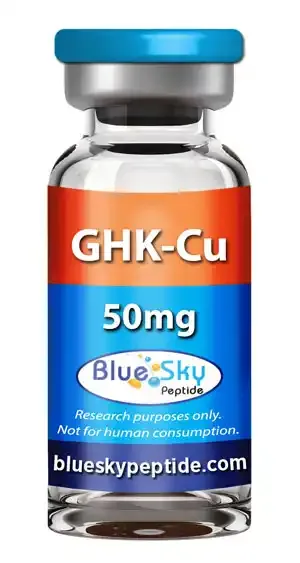45% Off Everything*
Save Now!!

Availability: In stock

| Unit Size | 50mg/vial |
| Unit Quantity | 1 vial |
| Purity (Mass Spectrometry and UV) | 98.5% |
| Sequence | Gly-His-Lys.Cu.xHAc |
| Molecular Formula | C14H23CUN604 |
| Appearance | Lyophilized White Powder |
| Source | Chemical Synthesis |
| Storage |
Lyophilized GHK-Cu 50mg Copper Peptide is Stable at room Temperature for 90 days, however it is best to storer in a freeze below - 8c for any extended period of time. After reconstitution GHK-Cu 50mg should be refrigerated at temperatures not to exceed 35 F. |
| Terms | The products we offer are intended for laboratory research use only. Please familiarize yourself with our terms of service prior to ordering. |
GHK-Cu 50mg copper peptide, short for Glycyl-L-Histidyl-L-Lysine Copper(II), is a chelated peptide formed by combining the GHK peptide with copper. Known for its diverse biological activities, GHK-Cu has garnered attention for its roles in tissue remodeling, angiogenesis promotion, and anti-inflammatory properties.
GHK-Cu has been extensively investigated for its tissue remodeling and wound healing properties.(1) Studies have demonstrated that GHK-Cu, especially at a concentration of 1 nM, stimulates the expression of growth factors like basic fibroblast growth factor (bFGF) and vascular endothelial growth factor (VEGF) in subjects dermal fibroblasts.(2-4) This upregulation of growth factors aids in angiogenesis, promoting blood vessel formation crucial for tissue repair. GHK-Cu also enhances the proliferation of HUVECs, further supporting angiogenesis and wound healing.(5) Additionally, GHK-Cu's ability to attract capillary cells, stimulate macrophages and mast cells, and facilitate collagen and elastin production underscores its role in tissue regeneration and wound contraction.(6-8)
In addition to wound healing, GHK-Cu has been studied for its effects on bone healing and osteoblastic cell attachment. Research has shown that GHK-Cu promotes collagen synthesis and enhances osteoblastic cell attachment, potentially contributing to bone regeneration processes.(9,10) Animal studies, including rat models of anterior cruciate ligament reconstruction (ACLR), have demonstrated improved healing outcomes with GHK-Cu treatment.(5,11)
GHK-Cu, along with its parent peptide GHK, has been investigated for its anti-inflammatory and antioxidant properties. GHK has been shown to quench cytotoxic end products of lipid peroxidation and reduce reactive oxygen species (ROS) levels in various cell types.(12) In animal models of fibrosis and acute lung injury, GHK and GHK-Cu treatments led to reduced inflammation markers like TNF-α and IL-6, highlighting their potential as anti-inflammatory agents. Mechanistic studies revealed suppression of NF-κB p65 and p38 MAPK signaling — key regulators of inflammation — by GHK-Cu, further supporting its anti-inflammatory effects.(13)
Studies on aging mice treated with GHK have shown promising results in improving cognitive function. Administration of GHK led to faster performance in spatial navigation learning tasks compared to control groups.(14)Immunohistochemical analysis of brain tissues indicated reduced inflammation and increased histone deacetylase 2 labeling, suggesting potential epigenetic mechanisms contributing to cognitive improvement with GHK treatment. These findings suggest a potential role for GHK in ameliorating age-related cognitive impairment, highlighting its broader neurological effects beyond tissue repair and inflammation modulation.
References: 1. Pickart L. The human tri-peptide GHK and tissue remodeling. J Biomater Sci Polym Ed. 2008;19(8):969-988. 2.Pollard JD, Quan S, Kang T, Koch RJ. Effects of copper tripeptide on the growth and expression of growth factors by normal and irradiated fibroblasts. Arch Facial Plast Surg. 2005;7(1):27-31. 3. Steiling H, Werner S. Fibroblast growth factors: key players in epithelial morphogenesis, repair and cytoprotection. Curr Opin Biotechnol. 2003;14(5):533-537. 4.Powers CJ, McLeskey SW, Wellstein A. Fibroblast growth factors, their receptors and signaling. Endocr Relat Cancer. 2000;7(3):165-197. 5. Wang X, Liu B, Xu Q, et al. GHK-Cu-liposomes accelerate scald wound healing in mice by promoting cell proliferation and angiogenesis. Wound Repair Regen. 2017;25(2):270-278. 6. Raju KS, Alessandri G, Gullino PM. Characterization of a chemoattractant for endothelium induced by angiogenesis effectors. Cancer Res. 1984;44(4):1579-1584. 7. Poole TJ, Zetter BR. Stimulation of rat peritoneal mast cell migration by tumor-derived peptides. Cancer Res. 1983;43(12 Pt 1):5857-5861. 8. Maquart FX, Bellon G, Chaqour B, et al. In vivo stimulation of connective tissue accumulation by the tripeptide-copper complex glycyl-L-histidyl-L-lysine-Cu2+ in rat experimental wounds. J Clin Invest. 1993;92(5):2368-2376. 9. Pohunková H, Stehlík J, Váchal J, Cech O, Adam M. Morphological features of bone healing under the effect of collagen-graft-glycosaminoglycan copolymer supplemented with the tripeptide Gly-His-Lys. Biomaterials. 1996;17(16):1567-1574. 10. Godet D, Marie PJ. Effects of the tripeptide glycyl-L-histidyl-L-lysine copper complex on osteoblastic cell spreading, attachment and phenotype. Cell Mol Biol (Noisy-le-grand). 1995;41(8):1081-1091. 11. Fu SC, Cheuk YC, Chiu WY, Yung SH, Rolf CG, Chan KM. Tripeptide-copper complex GHK-Cu (II) transiently improved healing outcome in a rat model of ACL reconstruction. J Orthop Res. 2015;33(7):1024-1033. 12. Sakuma S, Ishimura M, Yuba Y, Itoh Y, Fujimoto Y. The peptide glycyl-ʟ-histidyl-ʟ-lysine is an endogenous antioxidant in living organisms, possibly by diminishing hydroxyl and peroxyl radicals. Int J Physiol Pathophysiol Pharmacol. 2018;10(3):132-138. 13. Zhou XM, Wang GL, Wang XB, et al. GHK Peptide Inhibits Bleomycin-Induced Pulmonary Fibrosis in Mice by Suppressing TGFβ1/Smad-Mediated Epithelial-to-Mesenchymal Transition. Front Pharmacol. 2017;8:904. Published 2017 Dec 12. 14. Mukherjee KK, Lee AY, Zhu L, Darvas M, Ladiges W. Sleep-deprived cognitive impairment in aging mice is alleviated by rapamycin. Aging Pathobiol Ther. 2019;1(1):5-9.